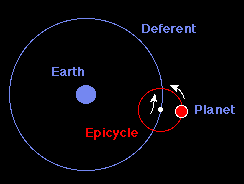
Copernicus
Nicolaus Copernicus (19 February 1473 – 24 May 1543) was a Renaissance mathematician and astronomer who formulated a heliocentric model of the universe which placed the Sun, rather than the Earth, at the center. He is generally considered to be the initiator of the Scientific Revolution.
His most developed model of the system was set out in on De revolutionibus orbium coelestium, published by Johannes Petreius at Nuremberg in the year of his death. The Lutheran theologian, Andreas Osiander oversaw the final stage of the printing, and added an unauthorised and unsigned preface expressing a broadly instrumentalist view of its main findings, namely that the heliocentric system need not provide causes for the observed motions, but merely descriptions that may facilitate calculations, that need not correspond to the truth.
 Copernicus himself said that the chief virtue of his system was that it abolished the equant, introduced by Ptolemy, whereby the angular velocities of epicycles was constant with respect to motion about a point off-set from the centre of each epicycle, not about the centre. Without the equant, and restricting the two systems to one epicycle for each planet only, Copernicus’ system can be mapped onto that of of Ptolemy by a simple change of coordinates. To do this certain underdetermined quantities in Ptolemy’s system must be fixed, namely, for the inner planets, the radius of the deferent and for the outer planets, the radius of the epicycle, must be chosen as equal to the Earth-Sun distance. There still remains an overall choice of scale. (In Ptolemy’s system, whilst the ratio of deferent to epicycle radius is fixed for each planet, the ratios of radii of deferents of different planets is arbitrary; likewise the ratios of radii of epicycles.)
Copernicus himself said that the chief virtue of his system was that it abolished the equant, introduced by Ptolemy, whereby the angular velocities of epicycles was constant with respect to motion about a point off-set from the centre of each epicycle, not about the centre. Without the equant, and restricting the two systems to one epicycle for each planet only, Copernicus’ system can be mapped onto that of of Ptolemy by a simple change of coordinates. To do this certain underdetermined quantities in Ptolemy’s system must be fixed, namely, for the inner planets, the radius of the deferent and for the outer planets, the radius of the epicycle, must be chosen as equal to the Earth-Sun distance. There still remains an overall choice of scale. (In Ptolemy’s system, whilst the ratio of deferent to epicycle radius is fixed for each planet, the ratios of radii of deferents of different planets is arbitrary; likewise the ratios of radii of epicycles.)
Copernicus was born in Toron, an inland port of the Hanseatic League. He studied in Cracow and Bologna, where he began to make astronomical observations, and later in Warmia, in the latter phase of his life. His observations improved little on those of Ptolemy.
